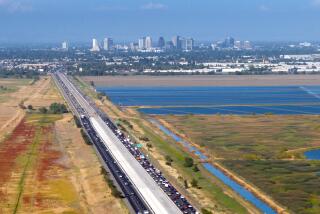O.C. Diamond Lane Study Runs Into an Official Detour
- Share via
Transportation officials are recommending that Orange County back away from plans to commission the first comprehensive study of whether carpool lanes work and instead push forward with the final leg of the county’s diamond lane network.
The study, requested in August by the Orange County Transportation Authority’s board of directors, was hailed by carpool-lane critics as an important challenge to the rapid growth of such lanes on freeways across Southern California.
But OCTA officials who looked into doing the analysis concluded that the costs were too high and the timing wrong. The transportation board on Monday will consider the recommendation to defer the study until the county’s final carpool lanes--along the Garden Grove Freeway--are built.
A study released earlier this year found that more than a third of Orange County carpoolers refuse to use the lanes. Critics say the lanes are unsafe and underused. The time to study the lanes, they say, is before any more are built.
“I think what waiting does is make the study pretty useless,” said Dave Mootchnik, a member of the anti-diamond lane group Drivers for Highway Safety. “They’re just trying to go ahead and do what they planned to do all along.”
But OCTA officials argue that the freeway widening would not receive federal funding if it doesn’t include carpool lanes and that dropping the lanes might jeopardize the project.
In addition to delaying the study, officials recommended that the OCTA not explore the option of adding regular traffic lanes to the Garden Grove Freeway--an idea the board proposed in August. Researching that option would cost about $240,000. The carpool lane efficiency study would cost $155,000.
Supervisor Todd Spitzer, who pushed for the study in August, said his priority remains the widening of the Garden Grove Freeway, even if that means more carpool lanes. Spitzer said he is willing to delay the research until after the widening is completed as long as the report is completed before expensive freeway connector ramps are built.
“My concern was making multimillion dollar decisions about the future of [carpool] lanes without complete data,” he said. “But I don’t think this recommendation would keep that information from being collected.”
Monte Wade, head of OCTA special projects, said the agency remains open to looking at other uses for carpool lanes once they are all bulit.
“I think the point of view is to complete the system and then take a look at how [carpool] lanes perform. I don’t think we have the answer yet to whether or not the system could be used more efficiently,” he said.
But the anti-carpool lane people contend that’s bad policy.
“They’re spending good money after bad,” said Wayne King, who has worked against carpool lanes in Orange County for more than a decade. “Carpool lanes haven’t motivated any carpooling. We ought to learn from our mistakes.”
More to Read
Sign up for Essential California
The most important California stories and recommendations in your inbox every morning.
You may occasionally receive promotional content from the Los Angeles Times.














